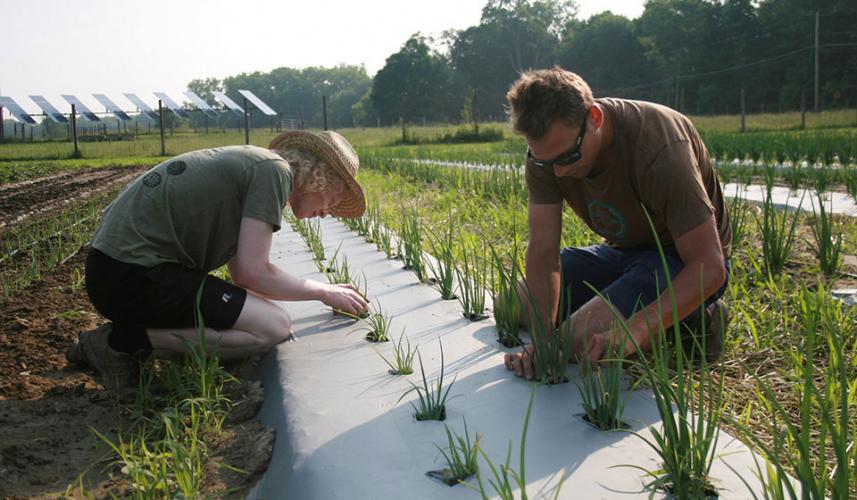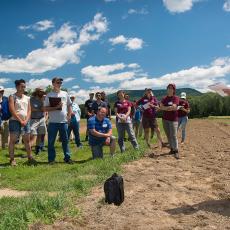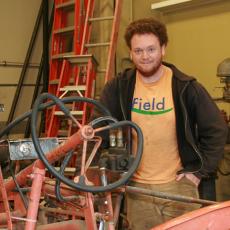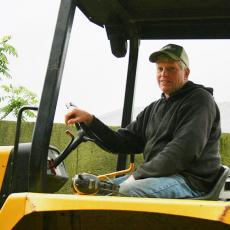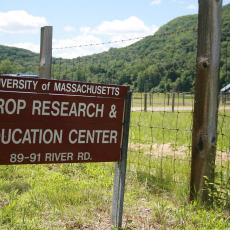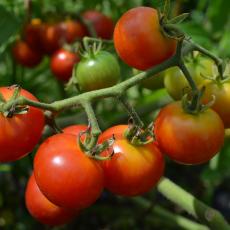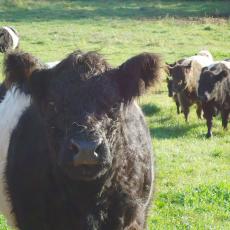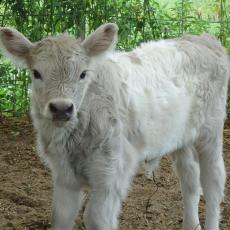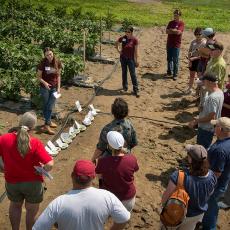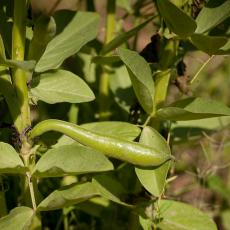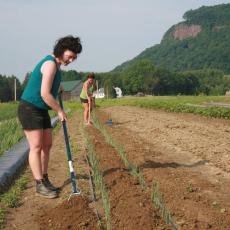In Our Spotlight
South Deerfield Crop & Animal Research and Education Center
Farm Superintendent Neal Woodard looks out over 358 acres of fields and pastures he is responsible for maintaining. Of that acreage, 145 acres are in production, the rest are forested. When asked what a typical day looks like for him, he just smiles and says, “There is no typical day. One day I am planting rye, then an hour later meeting with scientists. I could end my day by overhauling a tractor.” With 27 years at UMass under his belt, five of the most recent of those as Farm Superintendent, Woodard knows nearly every acre of this place.
The primary work at this UMass farm along the Connecticut River in South Deerfield has changed over time. Twenty years ago, management of a large dairy herd with a separate room for veterinary surgery dictated the learning experience. Today, dairy cows are long gone, replaced with iconic Belted Galloway (“belties”) cattle that graze the land offering research and educational opportunities as well as a visual delight to passersby.
UMass crop and animal researchers maintain a steady presence, keeping the site filled with activity and scientific investigations. Applied research takes place with faculty, extension staff, field staff, undergraduate and graduate students and technicians working side-by-side to complete studies that are then often published in scientific journals. Recent research has involved exploring the most energy-efficient storage of food, biochar effects, Integrated Pest Management (IPM) studies, examining bumblebees for disease-transmission effects from flowers and experimenting with intercropping of pigs and vegetables.
Crops grow abundantly on this farm, helped in part by 75-100 yards of compost produced annually on the site. Today, 19 separate research projects administered by ten faculty members and nine graduate students are underway. On this farm, 85 acres are dedicated to hay production, 30 acres are in crop production, 30 acres are pasture and nearly 200 acres are wooded. Learn more about UMass research facilities here.
The farm staff currently includes:
- Neal Woodard, Farm Superintendent
- Keith Lilly, Assistant Farm Superintendent
- Zachary Zenk, Assistant Farm Superintendent
Student Education
Six organic acres of the farm are devoted to the UMass Student Farming Enterprise (SFE) and supervised by Amanda Brown, lecturer at Stockbridge School of Agriculture. Jason Silverman, assistant for the SFE, keeps a steady hand on site, managing equipment and overseeing student work.
An energetic group of students grow over 40 different vegetables on this land. Seven additional acres at the UMass Agricultural Learning Center site on North Pleasant Street in Amherst are dedicated to the SFE. Guided by Brown, students can be found hand-weeding onions and other crops in late spring and servicing a 60-member on-campus CSA in the fall. SFE sells fresh food to UMass’s student-run Earthfoods Cafe, UMass Dining Services, UMass Student Farmers’ Market and two local Big Y Supermarkets. This program grows such high-quality food that the demand by new outlets now exceeds their capacity. They are choosing to decline the opportunity to expand sales in order to maintain their clear educational focus.
Every year, twelve to fifteen new student farmers take the lead on planning the season, working the land, harvesting and marketing the produce.
Several graduates of the Student Farming Enterprise have started their own farming enterprises or moved on to managerial positions at farms throughout the region, while others have established employment with organizations such as The Farm School and the Northeast Organic Farmers Association. Learn more about the SFE here.
Faculty Research
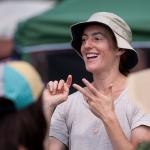 Lynn Adler (Department of Biology), and her research team are conducting a large experiment that asks (1) whether bee disease affects pollination services that translate into changes in crop yield and (2) whether the presence and choice of 'pollinator-friendly' plantings next to crops can affect bee disease loads, pollination service and bee reproduction. Each of the 18 tents on her research plot contain an array of canola plants (the focal crop) and a 'microcolony' of 15 bumble bees. Half the tents have bees that were infected with a common gut pathogen, and the other half are comprised of healthy bees. In addition, each tent has either just canola, or canola with plants that she has found have a high chance of transmitting bee disease, or canola with plants that seem to suppress bee disease. She is measuring bee foraging behavior, pollination, disease levels and colony survival/reproduction in repeated two-week trials over the summer. With this design, they can provide the first tests of whether bee health affects pollinator service and plant reproduction, and whether adding pollinator-friendly plants (and the choice of those plants) can affect bee health, survival and reproduction. Funding is provided through a $454,990 USDA grant.
Lynn Adler (Department of Biology), and her research team are conducting a large experiment that asks (1) whether bee disease affects pollination services that translate into changes in crop yield and (2) whether the presence and choice of 'pollinator-friendly' plantings next to crops can affect bee disease loads, pollination service and bee reproduction. Each of the 18 tents on her research plot contain an array of canola plants (the focal crop) and a 'microcolony' of 15 bumble bees. Half the tents have bees that were infected with a common gut pathogen, and the other half are comprised of healthy bees. In addition, each tent has either just canola, or canola with plants that she has found have a high chance of transmitting bee disease, or canola with plants that seem to suppress bee disease. She is measuring bee foraging behavior, pollination, disease levels and colony survival/reproduction in repeated two-week trials over the summer. With this design, they can provide the first tests of whether bee health affects pollinator service and plant reproduction, and whether adding pollinator-friendly plants (and the choice of those plants) can affect bee health, survival and reproduction. Funding is provided through a $454,990 USDA grant.
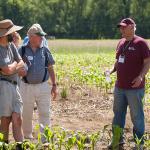 Masoud Hashemi (Stockbridge School of Agriculture) is studying sustainable agriculture through maintaining and improving soil health. He is doing this by promoting cover cropping and introducing new crops to the growers to increase their profitability while maintaining environmental quality. Current research projects include: building resilience and sustainability in dairy forage systems in New England; integrating no-till and forage radish cover crops for sustainable early sweet corn production; growing fava beans as double-cropping in Massachusetts; management practices for production of local malting barley in Northeast; developing best management practice for growing grain suitable for malt in the Northeast; and enhancing and evaluating soil health with hardwood biochar.
Masoud Hashemi (Stockbridge School of Agriculture) is studying sustainable agriculture through maintaining and improving soil health. He is doing this by promoting cover cropping and introducing new crops to the growers to increase their profitability while maintaining environmental quality. Current research projects include: building resilience and sustainability in dairy forage systems in New England; integrating no-till and forage radish cover crops for sustainable early sweet corn production; growing fava beans as double-cropping in Massachusetts; management practices for production of local malting barley in Northeast; developing best management practice for growing grain suitable for malt in the Northeast; and enhancing and evaluating soil health with hardwood biochar.
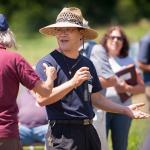 Longing for a heartier tomato? UMass Amherst is on it. Geunhwa Jung (Stockbridge School of Agriculture, Plant Biology Graduate Program) and Levi Lilly, a graduate student, are hard at work breeding tomato varieties with improved yields, disease resistance (especially late blight, one of the most devastating plant diseases of potato and tomato worldwide), site-specific adaptation to regional climate and soil conditions under low-inputs systems, including organic management regimes.
Longing for a heartier tomato? UMass Amherst is on it. Geunhwa Jung (Stockbridge School of Agriculture, Plant Biology Graduate Program) and Levi Lilly, a graduate student, are hard at work breeding tomato varieties with improved yields, disease resistance (especially late blight, one of the most devastating plant diseases of potato and tomato worldwide), site-specific adaptation to regional climate and soil conditions under low-inputs systems, including organic management regimes.
They are growing approximately 180 individuals (meaning offsprings/siblings of self-pollinated hybrid plants). These are the offsprings from two parents, “Moneymaker” and a wild species collected from the Galapagos island. They are being grown in conditions that use minimal amounts of fertilizer and irrigation. The hope is that the wide cross-segregating population will show large genetic variability that allows for selecting a few rare recombinants (individual plants with a different combination of genetic information from either of the parent plants). The expectation is that these new plants will be well-adapted to specific growing and management conditions. These selected plants will then be further advanced during the next 3-4 generations. The advanced lines with most desirable traits will be evaluated in multiple years and on farms with differing management practices.
Private companies and local growers have provided Jung and Lilly with seeds of their varieties, including heirlooms, to find additional sources of germplasm with desirable traits. A few dozen of these tomatoes will be evaluated for performance under different farming systems throughout the New England region. Top performing plants will be crossed to develop future breeding populations for further evaluation. Our tomato future is looking bright, hearty and delicious.
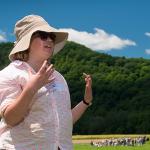 Madelaine Bartlett (Department of Biology) is conducting research on corn, looking for mutant genes in about 2,300 families of corn (each family from a separate ear). Flowering plants rule the world, and grasses, in particular, reign supreme. Grasslands cover much of the planet, and grass crops like corn, wheat, and rice form the bedrock of modern societies. Yet, little is understood about the genes controlling grass development from seed to seed. In the Bartlett lab, researchers aim to figure out the genetics of grass flower development, using corn. One of the tasks they undertake to understand floral development is to analyze mutants. This summer, there are approximately 41,000 potentially mutant individual plants in about 1,100 unique families of plants growing at the UMass farm that may or may not harbor mutant genes. Every week researchers walk through their cornfield looking for plants with mutant flowers. They will then use molecular biology to find the genes that have been mutated, resulting in disrupted floral development. Ultimately, they will stitch their understanding of all of these genes into a molecular map that describes how corn gets its flowers.
Madelaine Bartlett (Department of Biology) is conducting research on corn, looking for mutant genes in about 2,300 families of corn (each family from a separate ear). Flowering plants rule the world, and grasses, in particular, reign supreme. Grasslands cover much of the planet, and grass crops like corn, wheat, and rice form the bedrock of modern societies. Yet, little is understood about the genes controlling grass development from seed to seed. In the Bartlett lab, researchers aim to figure out the genetics of grass flower development, using corn. One of the tasks they undertake to understand floral development is to analyze mutants. This summer, there are approximately 41,000 potentially mutant individual plants in about 1,100 unique families of plants growing at the UMass farm that may or may not harbor mutant genes. Every week researchers walk through their cornfield looking for plants with mutant flowers. They will then use molecular biology to find the genes that have been mutated, resulting in disrupted floral development. Ultimately, they will stitch their understanding of all of these genes into a molecular map that describes how corn gets its flowers.
Belted Galloway Management Class
Katherine Beltaire (Department of Veterinary and Animal Sciences) teaches and advises the Belted Galloway management class. This iconic “oreo cow” breed currently numbers 15 on the site, including a rare silver dun-colored calf. This breed is more commonly marked black and white.
Beltaire’s management class provides students with the opportunity to learn about beef cattle production cycle and participate actively in all aspects of herd management, including: handling, vaccinating, deworming, breeding, calving, halter breaking, weaning, feeding, fitting, showing, marketing, and maintaining the health and welfare of the herd. And they are fun to watch, too, as they romp through the pasture.
Students also have the opportunity to visit local beef farms and attend livestock shows, such as the Big East Regional Youth and Jackpot Show in the spring. How did UMass Amherst come to raise Belted Galloways, you might ask? In March, 2003, UMass foundation stock traveled from Aldermere Farm in Maine to UMass. The Belted Galloway Group was started by interested students during the spring semester of 2004 and is now a credited course offered both fall and spring semesters. Students learn about artificial insemination methods for Belted Galloways under the direction of Beltaire. For more information, go to their website.
